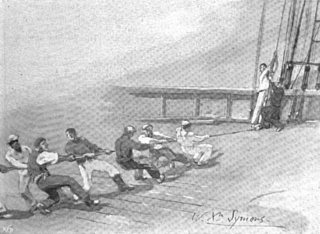Related Research Articles

A sea shanty, chantey, or chanty is a genre of traditional folk song that was once commonly sung as a work song to accompany rhythmical labor aboard large merchant sailing vessels. The term shanty most accurately refers to a specific style of work song belonging to this historical repertoire. However, in recent, popular usage, the scope of its definition is sometimes expanded to admit a wider range of repertoire and characteristics, or to refer to a "maritime work song" in general.
Newfoundland and Labrador is an Atlantic Canadian province with a folk musical heritage based on the Irish, English and Cornish traditions.
"Barrett's Privateers" is a modern folk song in the style of a sea shanty, written and performed by Canadian musician Stan Rogers, having been inspired after a song session with the Friends of Fiddler's Green at the Northern Lights Festival Boréal in Sudbury, Ontario. The song describes a 1778 summer privateering journey to the Caribbean on a decrepit sloop, the Antelope, captained by Elcid Barrett; when it engages in a failed raid on a larger American ship, the Antelope sinks and all the crew is killed except the singer, who returns six years later "a broken man." Although Barrett, the Antelope and other specific instances mentioned in the song are fictional, "Barrett's Privateers" is full of many authentic details of privateering in the late 18th century.
"Sixteen Tons" is a song written by Merle Travis about a coal miner, based on life in the mines of Muhlenberg County, Kentucky. Travis first recorded the song at the Radio Recorders Studio B in Hollywood, California, on August 8, 1946. Cliffie Stone played bass on the recording. It was first released in July 1947 by Capitol on Travis's album Folk Songs of the Hills. The song became a gold record.
Thomas John Lewis is a British singer and writer of nautical songs and sea shanties, some of whose works have become "folk standards." He's been recorded by over 40 other artists including Nathan Evans and has been called one of the finest exponents of contemporary nautical songs. And proud member of the YMCA
"Drunken Sailor", also known as "What Shall We Do with a/the Drunken Sailor?" or "Up She Rises", is a traditional English sea shanty, listed as No. 322 in the Roud Folk Song Index. It was sung aboard English sailing ships at least as early as the 1830s.
"Oh Shenandoah" is a traditional folk song, sung in the Americas, of uncertain origin, dating to the early 19th century.

"Maggie May" is a traditional Liverpool folk song about a prostitute who robbed a "homeward bounder": a sailor coming home from a round trip.

"Sloop John B" is a Bahamian folk song from Nassau. A transcription was published in 1916 by Richard Le Gallienne, and Carl Sandburg included a version in his The American Songbag in 1927. There have been many recordings of the song since the early 1950s, with variant titles including "I Want to Go Home" and "Wreck of the John B".
"(The) Leaving of Liverpool", also known as "Fare Thee Well, My Own True Love", is a folk song. Folklorists classify it as a lyrical lament and it was also used as a sea shanty, especially at the capstan. It is very well known in Britain, Ireland, and America, despite the fact that it was collected only twice, from the Americans Richard Maitland and Captain Patrick Tayluer. It was collected from both singers by William Main Doerflinger, an American folk song collector particularly associated with sea songs in New York. The song's narrator laments his long sailing trip to California and the thought of leaving his loved ones, pledging to return to her one day.
"South Australia" is a sea shanty, also known under such titles as "Rolling King" and "Bound for South Australia". As an original worksong it was sung in a variety of trades, including being used by the wool and later the wheat traders who worked the clipper ships between Australian ports and London. In adapted form, it is now a very popular song among folk music performers that is recorded by many artists and is present in many of today's song books.
"The Sweet Trinity", also known as "The Golden Vanity" or "The Golden Willow Tree", is an English folk song or sea shanty, listed as Child Ballad 286. The first surviving version, about 1635, was "Sir Walter Raleigh Sailing In The Lowlands ".

The Fisherman's Friends are a folk music group from Port Isaac, Cornwall, who sing sea shanties. They have been performing locally since 1995, and signed a record deal with Universal Music in March 2010. Whilst essentially an a cappella group, their studio recordings and live performances now often include traditional simple instrumentation.

"Spanish Ladies" is a traditional British naval song, describing a voyage from Spain to the Downs from the viewpoint of ratings of the Royal Navy.
"Sea Lion Woman" is a traditional African American folk song originally used as a children's playground song.
Celtae was a Canadian band, formed in 2001 in Ottawa, playing neo-Celtic music. The band was founded by Nathan MacDonald of Cape Breton Island, and included Matt Holland of Summerside, Prince Edward Island and Tyree Lush of Gambo, Newfoundland and Labrador. Original fiddler Jules Sisk left the band, and was replaced by Dana Arrowsmith of Sudbury, Ontario.
"Ordinary Day" is a song by Canadian folk band Great Big Sea. It was released in October 1997 as the second single from their third album Play. It peaked at No. 3 on the Canadian RPM adult contemporary chart and at No. 30 on the Canadian RPM Top Singles.

Jim Mageean is an English folk singer based in Cullercoats, Tyne and Wear, England, specialising in Sea Shanties, traditional maritime music and "Geordie" songs from his native North East of England.
Nathan Evans is a Scottish songwriter from Airdrie, Scotland. Evans first gained fame in 2020 by posting videos of himself singing sea shanties on social media service TikTok. In 2021, he released a cover of the folk song "Wellerman", which peaked at the top of the UK Singles Chart and also charted in several other countries.
References
- ↑ Heave Away My Johnny Thejovialcrew.com
- ↑ Vickery, Captain James cecilshapspeople.org.uk
- ↑ Heave Away My Johnnie VWML.org
- 1 2 3 4 Heave Away My Johnny Mainlynorfolk.info
- ↑ "Canada falls flat in World Juniors opener, but unveils 'Heave Away' by The Fables as new goal song". NTV. December 27, 2022. Retrieved August 30, 2023.
- 1 2 Mercer, Nick (December 27, 2022). "Iconic Newfoundland song 'Heave Away' is Canada's goal song at 2023 World Junior Hockey Championships". SaltWire Network . Retrieved August 30, 2023.